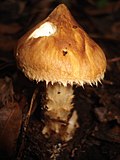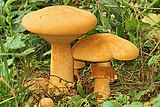Squamanitaceae
Appearance
| Squamanitaceae | |
|---|---|

| |
| Dissoderma odoratum | |
| Scientific classification | |
| Domain: | Eukaryota |
| Kingdom: | Fungi |
| Division: | Basidiomycota |
| Class: | Agaricomycetes |
| Order: | Agaricales |
| Family: | Squamanitaceae Jülich (1981) |
| Type genus | |
| Squamanita Imbach (1946)
| |
| Genera | |
|
Cystoderma | |
| Synonyms | |
| |
The Squamanitaceae are a family of fungi in the order Agaricales. All species in the family are agarics (gilled mushrooms). Species in two genera, Dissoderma and Squamanita, are parasitic on other agarics. Members of the Squamanitaceae are found worldwide.
Taxonomy
[edit]The family was first proposed in 1981 by Dutch mycologist Walter Jülich. Its current circumscription is the result of molecular research, based on cladistic analysis of DNA sequences.[1][2]
References
[edit]- ^ Liu JW, Ge ZW, Horak E, Vizzini A, Halling RE, Pan CL, Yang ZL (2021). "Squamanitaceae and three new species of Squamanita parasitic on Amanita basidiomes". IMA Fungus. 12 (1): 4. doi:10.1186/s43008-021-00057-z. PMC 7927255. PMID 33658081.
- ^ Saar I, Thorn RG, Nagasawa E, Henkel TW, Cooper JA (2022). "A phylogenetic overview of Squamanita, with descriptions of nine new species and four new combinations". Mycologia. 114 (4): 769–797. doi:10.1080/00275514.2022.2059639. PMID 35695889.





